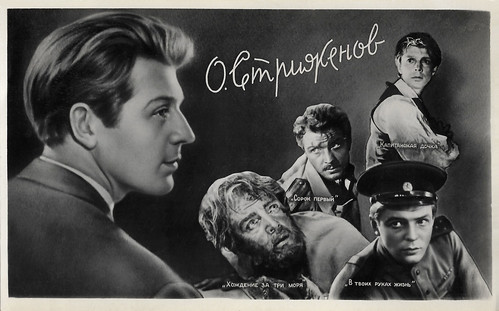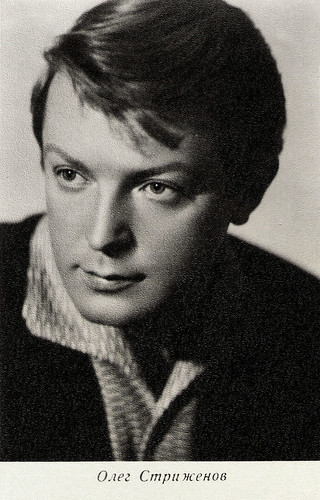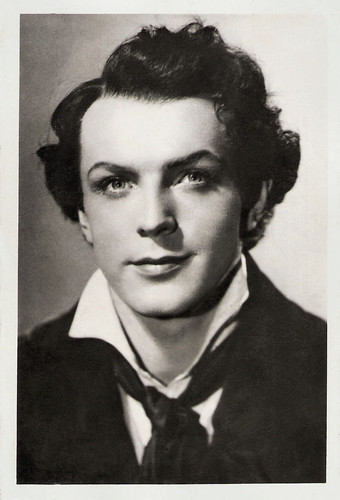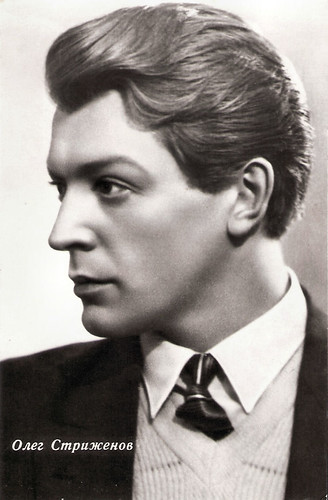
Russian postcard. Oleg Strizhenov and Izolda Izvitskaya in Sorok pervyy/The Forty-First (Grigori Chukhrai, 1956).

Russian postcard, no. 3326.

Soviet postcard by photo department Ed. 'Molot', Rostov-on-Don, no. 34, 1959. The card was issued in 75,000 copies. The price was 75 K. Pictures from Khozhdenie za tri morya/Journey Beyond Three Seas (Khwaja Ahmad Abbas, Vasili Pronin, 1957), Sorok pervyy/The Forty-First (Grigori Chukhrai, 1956), V tvoikh rukakh zhizn (Nikolai Rozantsev, 1959) and Kapitanskaya dochka/The Captain's Daughter (Vladimir Kaplunovskiy, 1958).

Russian postcard, no. M-40561, 1967. This postcard was printed in an edition of 300.000 cards. Retail price: 8 Kop.
The queen of spades
Oleg Aleksandrovich Strizhenov (Олег Александрович Стриженов) was born in Blagoveshchensk in the Far East of the Soviet Union (now Amur Oblast, Russia) in 1929. His brother Gleb and sister Marina would also become actors. In 1945 Oleg won the Medal ‘For Valiant Labour in the Great Patriotic War 1941-1945’. He completed the B. V. Shukin Higher Theatre School in 1953 and started as an actor in the Russian Theatre of Drama in Tallinn (in Estonia).
From 1954-1955, he acted at the Pushkin Theatre in Leningrad, and in 1957 he was at the Screen Actors Theatre and Studio in Moscow. In 1951, he had already started his film career with an uncredited bit part in Sportivnaya chest/Sporting Honour (Vladimir Petrov 1951). In 1955 he played the lead in the drama Ovod/The Gadfly (Aleksandr Fajntsimmer, Iosif Shapiro, 1955), based on the novel 'The Gadfly' by Irish author Ethel Lilian Voynich.
It was followed by the war drama Sorok pervyy/The Forty-First (Grigori Chukhrai, 1956) based on the eponymous novel by Boris Lavrenyev. Set during the Russian Civil War the film tells the story of a tragic romance between a female sniper of the Red Army (Izolda Izvitskaya) and an officer of the White Army (Oleg Strizhenov). For his role, Strizhenov got a special prize at the Cannes Film Festival.
In 1957, he starred in the popular Indian-Soviet film Khozhdenie za tri moray/Journey Beyond Three Seas (Khwaja Ahmad Abbas, Vasili Pronin, 1957). It was based on the travelogues of 15th-century Russian traveller Afanasy Nikitin, which is now considered a Russian literary monument. The film was nominated for the Golden Palm at the 1958 Cannes Film Festival.
Another highlight in his film career is the film opera Pikovaya dama/The Queen of Spades (Roman Tikhomirov, 1960), based on the Aleksandr Pushkin short story of the same name. For his performance as Hermann opposite Olga Krasina as Lisa, Strizhenov received Aleksandr Pushkin's Big Gold Medal and the prize of the Russian Musical Fund of Irina Arkhipova.

Russian postcard by Izdanije Byuro Propogandy Sovietskogo Kinoiskusstva, no. M 17562 18/II, 1965. This postcard was printed in an edition of 15.000 cards. Retail price: 8 Kop.

East German postcard by VEB Progress Film-Vertrieb, Berlin, no. 574, 1957. Photo: Sovexportfilm.

Russian postcard, no. M-19577, 165, 1958. This postcard was printed in an edition of 50.000 cards. Retail price: 70 Kop.
Optimistic tragedy
In 1963, Oleg Strizhenov appeared in Optimisticheskaya tragediya/Optimistic Tragedy (Samson Samsonov, 1963), which was entered into the 1963 Cannes Film Festival. During the Russian Revolution of 1917, the Marine squad, led by anarchist leader Vozhak (Boris Andreyev) started the revolt. The Central Committee of the Bolshevik Party sends a woman Commissar (Margarita Volodina) to form a Red Army battalion from the Marines to take part in the Russian Civil War.
The film was shot in Sovscope 70 on black and white film stock. The prints were split into three films for exhibition in Kinopanorama 70 in some theatres. Optimisticheskaya tragediya was the blockbuster in the Soviet cinemas of 1963 with 46 million tickets sold. The film was named Best Film of the Year and Margarita Volodina was named Best Actress of the Year by readers of the Soviet film magazine Sovetsky Ekran.
In 1966 Strizhenov played Pyotr Ilyich Tchaikovsky in the French-Russian Tretya molodost/Nights of Farewell (Jean Dréville, Isaak Menaker, 1966) with Gilles Ségal as Marius Petipa. From 1966 to 1976 he acted at the Moscow Artists' and Actors' Theatre. In 1970, he was voted best actor of the year for his role as the pilot Egorov in Nepodsuden/Not Under the Jurisdiction (Vladimir Krasnopolskiy, Valeriy Uskov, 1970).
He also appeared in the costume drama Zvezda plenitelnogo schastya/The Captivating Star of Happiness (Vladimir Motyl, 1975). The story is set in the aftermath of the December revolt against Tsar Nicholas I in 1825. The revolt is repressed, and the military officers involved confess one by one. They are sentenced to exile in Siberia and their wives face the decision as to whether or not to follow them. His wife in the film was played by Natalya Bondarchuk. Other interesting films are the romantic drama Poslednyaya zhertva/The Last Victim (Pyotr Todorovskiy, 1977) with Margarita Volodina, the biographical drama Yunost Petra/The Youth of Peter the Great (Sergei Gerasimov, 1981) and Moy lyubimyy kloun (Yuriy Kushneryov, 1986).
Between 1987 and 2000 he made no films. Oleg Strizhenov was named a People's Artist of the Soviet Union (Народный артист СССР) in 1988. In 2000 made a come-back with the lead role in Vmesto menya/Instead of Me (Vladimir Basov Ml., Olga Basova, 2000). It was to be his final role. In 2004 he was honoured with the Order of Merit for the Fatherland; 2nd class - For outstanding achievements in the field of cinema and many years of creative activity. During his career, he won many more awards and other honours. Oleg Strizhenov died at a Moscow hospital on 9 February 2025, at the age of 95. He was survived by his third wife, Lionella Pyryeva. His son is the Russian actor, writer, producer, and director Aleksandr Strizhenov.

Russian postcard, no. 47071, 1961.

Russian postcard.

Russian postcard, no. M-55858, 1963. This postcard was printed in an edition of 150.000 cards. Retail price: 8 Kop.
Sources: Voice of Russia ((Now defunct), Wikipedia and IMDb.
No comments:
Post a Comment